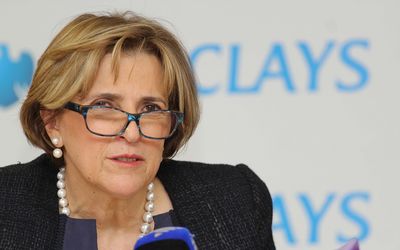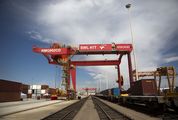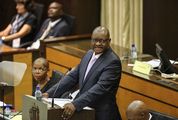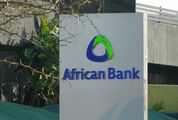BANKER Barclays Africa will invest more than R2.7bn over the next three years in its shared growth programme, CEO Maria Ramos said on Wednesday.
At a CEO Engage event hosted by the Gordon School of Business Science, Ramos said this would include an investment of the bank’s money in youth education and skills training programmes across Africa, and R1.3bn in small and medium enterprises financing raised through its banking divisions together with clients and partners this year.
READ THIS: Government and private sector investment in youth vital as their numbers rise
Ramos said it was part of a strategic commitment in which Barclays Africa would contribute to education and skills training in the markets in which it operates, enterprise development and financial inclusion.
“They are a direct response to arguably the greatest need and social stability threat facing the continent,” she said.
“Despite it being popular we have desisted from talking about or making promises in respect of job creation because we understand that we have to deal with a fundamental obstacle, and that is whether the human capital we have matches the skills needs of the global economy.”
Most of SA’s unemployed were younger than 34, with unemployment highest among those without matric, or with matric only.
“The rate of unemployment reduces dramatically with post-matric formal and on-the-job training, while it is in single digits for university graduates.”
Skills development was essential to attracting investment, growing the economy and creating jobs, Ramos said.
“If we cannot develop a solid skills base for our economy and the direction it should take we cannot attract investment.
READ THIS: Skills gap needs broad effort
“If we cannot attract investment we cannot grow the economy.
This means we cannot create jobs,” she said.
SA’s economy had lost more than 300,000 jobs in the first quarter of 2016, Ramos said.
This partly contributed to unemployment rising to an eight-year high of 26.7%.
Barclays Africa would invest R1.4bn over the next three years in youth education and skills training programmes across Africa. It is also raising, with its partners and clients, R1.3bn in 2016 to fund small and medium enterprises.
The National Development Plan, the government’s blueprint for eliminating poverty and reducing inequality, has set ambitious goals for the sector, but small businesses continue to face challenges such as red tape, a lack of access to finance and the high cost of doing business.
Ramos also urged the private sector, government and civil society to work together to address the “massive divisions in wealth and income” across the continent.
African leaders needed to keep up with innovation and new ways to invest and grow the economy, Ramos said.

Maria Ramos. Picture: MARTIN RHODES
BANKER Barclays Africa will invest more than R2.7bn over the next three years in its shared growth programme, CEO Maria Ramos said on Wednesday.
At a CEO Engage event hosted by the Gordon School of Business Science, Ramos said this would include an investment of the bank’s money in youth education and skills training programmes across Africa, and R1.3bn in small and medium enterprises financing raised through its banking divisions together with clients and partners this year.
READ THIS: Government and private sector investment in youth vital as their numbers rise
Ramos said it was part of a strategic commitment in which Barclays Africa would contribute to education and skills training in the markets in which it operates, enterprise development and financial inclusion.
“They are a direct response to arguably the greatest need and social stability threat facing the continent,” she said.
“Despite it being popular we have desisted from talking about or making promises in respect of job creation because we understand that we have to deal with a fundamental obstacle, and that is whether the human capital we have matches the skills needs of the global economy.”
Most of SA’s unemployed were younger than 34, with unemployment highest among those without matric, or with matric only.
“The rate of unemployment reduces dramatically with post-matric formal and on-the-job training, while it is in single digits for university graduates.”
Skills development was essential to attracting investment, growing the economy and creating jobs, Ramos said.
“If we cannot develop a solid skills base for our economy and the direction it should take we cannot attract investment.
READ THIS: Skills gap needs broad effort
“If we cannot attract investment we cannot grow the economy.
This means we cannot create jobs,” she said.
SA’s economy had lost more than 300,000 jobs in the first quarter of 2016, Ramos said.
This partly contributed to unemployment rising to an eight-year high of 26.7%.
Barclays Africa would invest R1.4bn over the next three years in youth education and skills training programmes across Africa. It is also raising, with its partners and clients, R1.3bn in 2016 to fund small and medium enterprises.
The National Development Plan, the government’s blueprint for eliminating poverty and reducing inequality, has set ambitious goals for the sector, but small businesses continue to face challenges such as red tape, a lack of access to finance and the high cost of doing business.
Ramos also urged the private sector, government and civil society to work together to address the “massive divisions in wealth and income” across the continent.
African leaders needed to keep up with innovation and new ways to invest and grow the economy, Ramos said.
























